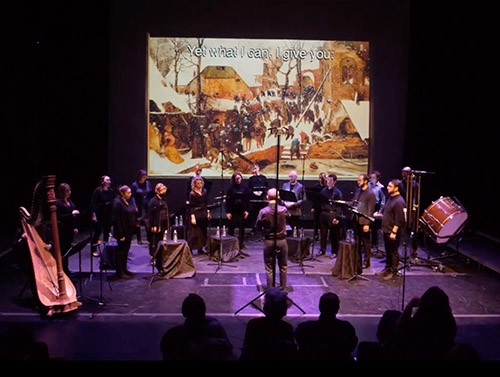by Peter Feher

Friday’s concert saw expert singing in service of sincere emotion, vividly realizing this stark Christmas story adapted from Hans Christian Andersen.
There’s no trace of a happy ending in Andersen’s original 19th-century fairy tale. The titular character in “The Little Match Girl” freezes to death on New Year’s Eve after being kicked out of the house by her father, losing her slippers in the street, and failing to sell any matches to passersby who can’t spare so much as a penny.
On its surface, Lang’s setting might seem to reinforce that severity. In the crisp, focused, minimalist style that this contemporary American composer has made his signature, the singers often dwell on a single word and a single pitch, isolated and repeated like pointillist dots contributing to a textured whole. Simple percussion instruments — bells, crotales, a couple of drums — are the only accompaniment throughout the piece’s 35 minutes.
Yet Lang’s compositional genius lies in his ability to convey the rich, varied emotions of his source material. His score doesn’t shy away from feeling. In fact, it invites ardent reflection via passages conceived in the spirit of such sacred oratorios as Handel’s Messiah and J.S. Bach’s St. Matthew Passion (especially the latter — hence the “passion” of Lang’s title).
Extended sections commenting on the action from a distance — and homing in on moral concepts like penance, remorse, patience, and mercy — alternate with narrative movements that relate the plot at a brisk pace. In one moment, the singers are bystanders, appealing to God but unable to intervene. The next, they’re confidants, privy to the fantastical visions that the little girl sees in the flames of the matches she lights to keep warm.
Under the artistic direction of Gregory Ristow, the Cleveland Chamber Choir gave a sensitive performance attuned to every shift in storytelling, allowing the ingenuity of Lang’s setting to shine through.
The evening ended with a choice carol, “Good King Wenceslas,” in a graceful new arrangement by Ristow. Never has this song’s message (“Ye who now will bless the poor, shall yourselves find blessing”), delivered in a soothing solo by bass Dominic Aragon, sounded so welcome and yet so melancholy.
A half dozen additional carols filled out the first part of the intermission-less program, with harpist Ina McCormack adding sparkling accompaniment to several. Selections by Benjamin Britten, Zoltán Kodály, Ralph Vaughan Williams, Reena Esmail, Evan Ramos, and Abbie Betinis all had something of a modernist slant. They were further united by a series of electronic interludes commissioned from local composer Tom Lopez, which lent a spectral, otherworldly atmosphere to these concerts scheduled for the darkest days of the year.
Students at the School of the Arts had crafted visual works that were projected on a screen behind the performers, bringing another dimension to a remarkably all-embracing program.
Published on ClevelandClassical.com January 7, 2025
Click here for a printable copy of this article



